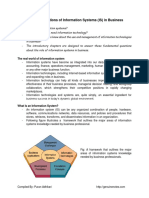0% found this document useful (0 votes)
5 views34 pagesLecture 3 CIT
The document discusses the importance of computers in business, highlighting their role in enhancing efficiency, data management, communication, marketing, decision-making, and cost reduction. It also outlines various applications of computer technology in business operations, including inventory management, e-commerce, online banking, and real-time analytics. Overall, it emphasizes how computers have transformed traditional business processes and improved productivity across different sectors.
Uploaded by
nnonditachowdhuryCopyright
© © All Rights Reserved
We take content rights seriously. If you suspect this is your content, claim it here.
Available Formats
Download as PDF, TXT or read online on Scribd
0% found this document useful (0 votes)
5 views34 pagesLecture 3 CIT
The document discusses the importance of computers in business, highlighting their role in enhancing efficiency, data management, communication, marketing, decision-making, and cost reduction. It also outlines various applications of computer technology in business operations, including inventory management, e-commerce, online banking, and real-time analytics. Overall, it emphasizes how computers have transformed traditional business processes and improved productivity across different sectors.
Uploaded by
nnonditachowdhuryCopyright
© © All Rights Reserved
We take content rights seriously. If you suspect this is your content, claim it here.
Available Formats
Download as PDF, TXT or read online on Scribd
/ 34






















































































